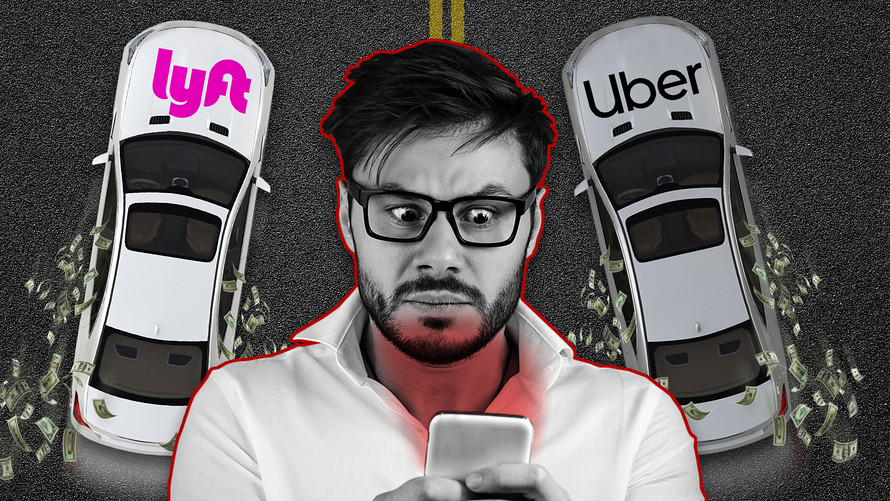 MarketWatch photo illustration/iStockphoto
MarketWatch photo illustration/iStockphoto
In a blog post Wednesday, Uber said that riders and drivers in the U.S. and Canada may lose access to Uber if they develop a “significantly below-average” rating. It’s the latest sign that consumers and service providers are under pressure to earn stars and keep smiling.
Here’s one harried consumer’s story:
During a recent stay at an Airbnb in Brazil, my host invited me to eat a traditional local snack of pão de queijo and have tea. It was a lovely gesture, but it was 10 p.m. and I had arrived from an 18-hour bus ride through the countryside earlier that day.
I just wanted to sleep.
But when gauging whether to go to bed or be friendly, I had to consider another factor: My Airbnb rating. The app lets hosts and guests rate each other on cleanliness, friendliness and “overall experience.” If I rejected her invite, would the host think I was rude? Or, if I did eat with her, would she think I was freeloading and look upon me less favorably?
Simple gestures are tied to a five-star rating system and have become fraught with mathematical appraisals.
Simple gestures and acts of goodwill are tied to a five-star rating system and have become fraught with mathematical appraisals.
Airbnb was founded in 2008 to “create a world where anyone can belong anywhere.” But that belonging is now quantified and monetized, making every interaction with a host or guest a risky proposition. It may cost you your five-star rating.
(Airbnb did not respond to request for comment for this story).
“The reputation economy is making us a little more careful in everything we say, how we say it, and what we do because we have to evaluate each other — it has created equal power on both sides,” said Russell W. Belk, a professor of marketing at Schulich School of Business at York University in Canada and author of 2013 research paper You are what you can access: Sharing and collaborative consumption online.
In the past, consumers held more power in purchasing situations, Belk said. A hotel would strive to get a nice rating from the traveler on TripAdvisor or Yelp. The traveler, meanwhile, would have no reason to fear reprisal for less-than-perfect behavior on a stay, except in extreme cases. Airbnb has shifted that model, he added, by blending the social and the commercial.
‘People are playing a game and pretending it’s a lovely social exchange when it is, in fact, a business exchange.’
“People are playing a game and pretending it’s a lovely social exchange — hosts sharing local tips with guests and guests sharing knowledge and skills from their native land — when it is, in fact, a business exchange,” he said. “Because money is exchanged via credit card, it’s largely invisible at the point of engaging and becomes something forgotten, or intentionally forgotten.”
It’s not just Airbnb, of course: Nearly every sharing economy app — Uber, Lyft, Seamless — requires us to rate experiences with other humans almost immediately after we’ve had them.
(A spokesman for Uber told MarketWatch it believes its rating system helps to ensure that experiences on the app are enjoyable and safe for both riders and drivers. It providers riders with detailed information on how ratings are calculated.)
The number of Americans who anticipated using at least one sharing-economy service declined to 47% last year from 50% in 2017, numbers from the Allianz Travel Insurance Sharing Economy Index showed. This comes after a surge in use of sharing-economy services in previous years, from 17% in 2015 and 36% in 2016.
One theory for the slowdown in growth: Some people, initially excited by the convenience of the sharing economy, may have now experienced the anxieties and pitfalls of navigating the rating system, Belk said.
 Author image
Author image
The blurring of the lines between the social and commercial is not good for consumers, says Christopher Elliott, witer and founder of consumer advocacy site Elliott.org.
Elliott himself quit Airbnb more than a year ago after a host decimated his average rating, giving him a 1 out of 5 star rating for forgetting to return the keys. He said it was an honest mistake and overnight mailed them back the next day, but Airbnb threatened to kick him off the app after he got the negative feedback.
Elliott is not alone. A study published by the BI Norwegian Business School in 2017 found that “negative emotions can be especially detrimental to customer loyalty in the sharing economy. In other words, the guilt and anxiety we feel using apps where we are prompted to rate every experience we have may be driving us away from them.”
Christopher Elliott quit Airbnb after a host decimated his average rating, giving him a 1 out of 5 star rating.
“The balance of power has shifted, and not in a good way,” Elliott said. “People are so afraid of retaliation for giving an honest review that there is a chilling effect.”
Guilt is a common sentiment this writer hears when discussing the sharing economy. One friend told me she feels anxiety about giving an Uber driver a negative rating because she worries about the long-term effects it may have on their livelihoods.
“Even if they are awful, rude, bad at driving, et cetera, it makes me anxious that a bad rating may cost them their job,” she said. “It feels weird that people in the service industry aren’t allowed to have an ‘off’ day now.”
Meeting the person you are rating, whether for a 20-minute cab ride or a week-long stay in their home, makes rating them complex.
After another recent stay at an Airbnb in Martinique, I was prompted to rate a stay which was, by all measures, thoroughly mediocre. The bedroom was dirty, the shower barely functional, and the home itself was further from the city center than advertised.
But the local family who rented out the room was lovely, with several generations including a 5-year-old girl living alongside us for the week. Would an honest rating have negatively affected their ability to earn extra income or, at the very least, simply hurt their feelings? I weighed the guilt I felt over hurting my hosts over the impulse to be honest and ended up never rating the home at all.
Hosts and guests hope to earn positive accolades in the form of smiles, five-star reviews and fictive relationships.
Marian Makkar, an assistant professor at Auckland University of Technology in New Zealand, has studied this phenomenon. A dual-review system is “unlike anything consumers have experienced before,” she said, and that the intimacy may prevent consumers from being honest in their reviews in a way that traditional models never did.
“Soon the bubble will burst to reveal what is actually happening here,” she said. “Guests are using someone else’s home to stay in at a lower price.” Hosts and guests hope to earn positive accolades in the form of smiles, five-star reviews and fictive relationships, she added. “The two parties don’t question this. It’s something I call, an ‘open secret’ of the home-sharing experience.”
To be fair, my experiences with sharing economy apps have been largely positive. I live in a part of Brooklyn where it’s rare to stumble upon a cab, and apps like Uber, Lyft LYFT, -1.11% and Juno have been indispensable for getting around.
I’ve stayed at more than 20 Airbnb locations in places including Montreal, Buenos Aires, Kansas City, Missouri and Philadelphia. I’m still in contact with some kind hosts who have shared their homes and their lives with me.
But increasingly I find the stress of being rated reciprocally outweighs the price and convenience of booking a room in someone else’s home.
My last night in Brazil, after my Airbnb stay ended, I booked a room at a hotel chain a few blocks away. For a marginally higher price than my room on Airbnb, I got to sleep in the exact same sheets everyone in the building slept in, was provided with a basic variety of snacks in the mini-bar, and given a uniform key in for the door. It was standard, boring, and delightfully predictable.
Thankfully, I did not get rated on my way out the door.
(This story was originally published on March, 29, 2019.)










Add Comment